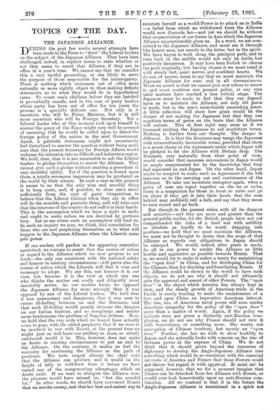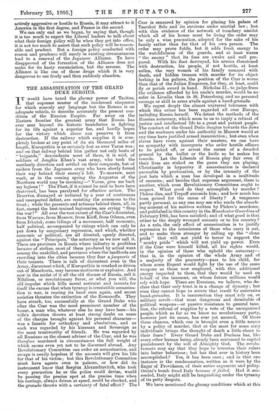D URING the past few weeks several attempts have been made
in the Press to " draw " the Liberal leaders on the subject of the Japanese Alliance. They have been challenged, indeed, in explicit terms to state whether or not they mean to renew that Alliance if they are in office in a year's time. We cannot say that we consider this a very tactful proceeding, or one likely to serve the purpose of those responsible for the interrogatory. There is nothing which statesmen out of office more naturally or more rightly object to than making definite statements as to what they would do in hypothetical cases. To count one's chickens before they are hatched is proverbially unsafe, and in the case of party leaders whose party has been out of office for ten years the process is a specially delicate one. Not only is it uncertain who will be Prime Minister, but it is still more uncertain who will be Foreign Secretary. Yet a Liberal leader who at this moment took upon himself to answer the query of the Times might very well be accused of assuming that he would be called upon to direct the foreign policy of the nation in the next Government. Again, a patriotic statesman might not unnaturally feel disinclined to answer the question without being quite sure that the present Secretary for Foreign Affairs would welcome his intrusion into so difficult and intimate a region. We hold, then, that it is not reasonable to ask the Liberal leaders to pledge themselves to renew the Alliance. They cannot give such a pledge without creating a precedent of very doubtful utility. Yet if the question is forced upon them, a totally erroneous impression may be produced on the world by their silence. In such a case as the present it seems to us that the only wise and sensible thing is to keep quiet, and, if possible, to clear one's mind sufficiently from the cant of party vituperation to believe that the Liberal Cabinet when they are in office will do the sensible and patriotic thing, and will take care that the interests of the country do not suffer in their hands This is the assumption which we have a right to make and ought to make unless we are deceived by partisan fury. Let us see where such an assumption will lead us. In such an inquiry we may, we think, find consolation for those who are now perplexing themselves as to what will happen to the Japanese Alliance when the Liberals come into power.
If our readers will pardon us for appearing somewhat egotistical, we venture to assert that the course of action in regard to the Alliance which we now propose to set forth—the only one consistent with the national safety and honour in existing circumstances—will prove also the course of action which the Liberals will find it wise and necessary to adopt. We say this, not because it is our view, but because it is the view at which any one who thinks the matter out coolly and diligently must inevitably arrive. As our readers know, we opposed the Japanese Alliance far more strongly than it was opposed by any of the Liberal leaders. We held that it was unnecessary and dangerous, that it was sure to create ill-feeling between us and the Russians, and that such ill-feeling would greatly increase the dangers on our Indian frontier, and so complicate and render more burdensome the problem of Imperial defence. Now, we hold that the very evils which we feared have actually come to pass, with the added perplexity that if we were to be involved in war with Russia at the present time we might just as well leave our artillery in store, so utterly outclassed would it be. This, however, does not make us desire in existing circumstances to put an end to the Alliance. On the contrary, it makes us feel the necessity for continuing the Alliance as the path of prudence. We have reaped already the chief evils that the Alliance can produce, and it would be the height of folly to withdraw from it before we have tasted any of the compensating advantages which no . doubt exist. If we were to abrogate the Alliance now, the pleasure would have missed us, " but the scandal hit." In other words, we should have convinced Russia that we are the enemy, and that her best and easiest way to reinstate herself as a world-Power is to attack us in India —a belief from which no withdrawal from the Alliance would now dissuade her—and yet we should be without that augmentation of our forces in Asia which the Japanese Alliance unquestionably gives us. In a word, we are com- mitted to the Japanese Alliance, and must see it through like honest men, not merely in the letter, but in the spirit. We have begun to walk along the precipice path, and to turn back in the middle would not only be futile, but positively dangerous. It may have been foolish to choose the path originally, but having chosen it we must tread it with steady feet, quiet nerves, and confident hearts. We do not, of course, mean to say that we must maintain the Japanese Alliance for ever, and in all circumstances. What we assert is that we cannot just now refuse to renew it, and must continue our present policy, at any rate until matters have reached a less critical stage. The Japanese must be made to feel that they can depend upon us to maintain the Alliance, not only till peace is made, but in the years immediately succeeding peace. A little reflection will show how great would be the danger of not making the Japanese feel that they can negotiate terms of peace on the basis that the Alliance will endure. This at first sight may seem as if we favoured inciting the Japanese to ask exorbitant terms. Nothing is further from our thought. The danger is different. It is that the Russians may tempt the Japanese with extraordinarily favourable terms, provided that there is a secret clause in the Agreement under which Japan will be pledged to let the Alliance with Britain drop. The Russians, very naturally from their point of view, would consider that immense concessions to Japan would be amply compensated for by the knowledge that they had separated us and Japan. On the other hand, Japan might be tempted to make such an Agreement if she felt insecure as to the carrying out and continuance of the Alliance. To take our mountain metaphor again, when a party of men are roped together on the ice or rocks, there is a temptation for those in front to untie and go on alone if they get it into their heads that the men behind may suddenly call a halt, and say that they mean to turn round and go back.
But though in the present crisis, with all its dangers and anxieties—and they are more and greater than the general public realise, for the British people have not yet comprehended the risks of a land war with artillery so obsolete as hardly to be worth dragging into position—we hold that we must maintain the Alliance, we must not be thought to desire that the scope of that Alliance as regards our obligations to Japan should be enlarged. We would, indeed, after peace is made, do all in our power to render the Alliance as little hostile and aggressive as possible towards Russia. That is, we would try to make it rather a treaty for maintaining the "open door" in China, and for developing China for the Chinese, than for checking and humiliating Russia. If the Alliance could be shown to the world to have such objects, we do not see why it should not ultimately gain the approval and assent of other Powers. The " open door" is the object which America has always kept in view, and the steady growth of American trade in the Pacific is surely tending to make the maintenance of a free and open China an imperative American interest. The rise, too, of American naval power will soon render American sympathy for the policy of the " open door " more than a matter of words. Again, if the policy we indicate were not given a distinctly anti-Russian com- plexion, we do not see why France should not view it with benevolence, or something more. She wants, not annexation of Chinese territory, but merely an " open door." Further, she has no wish to show hostility to Japan, and she naturally looks with concern on the rise of German power at the expense of China. We do not think that it should prove beyond the resources of diplomacy to develop the Anglo-Japanese Alliance into something which would be so consistent with the essential interests of America and France that those Powers could not choose but regard it with approval. It must not be supposed, however, that we for a moment imagine that France can be detached from her Alliance with Russia, or would ever look benevolently upon an anti-Russian com- bination. All we contend is that if in the future the Anglo-Japanese Alliance is maintained in a spirit not We can only end as we began, by saying that, though it is too much to expect the Liberal leaders to talk about what their foreign policy will be when they get into office, it is not too much to assert that such policy will be reason- able and, prudent. But a foreign policy conducted with reason and prudence will surely in existing circumstances lead to a renewal of the Japanese Alliance. To have disapproved of the formation of the Alliance does not make for its hasty renunciation, but the reverse. The Alliance is like one of those drugs which it is very dangerous to use freely and then suddenly abandon.







































 Previous page
Previous page